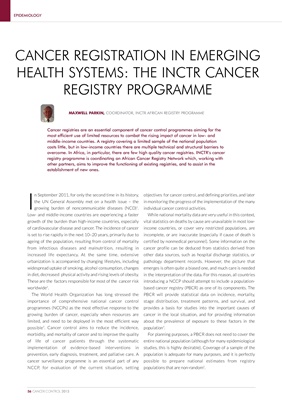
EPIDEMIOLOGY
CANCER REGISTRATION IN EMERGING
HEALTH SYSTEMS: THE INCTR CANCER
REGISTRY PROGRAMME
MAXWELL PARKIN, COORDINATOR, INCTR AFRICAN REGISTRY PROGRAMME
Cancer registries are an essential component of cancer control programmes aiming for the
most efficient use of limited resources to combat the rising impact of cancer in low- and
middle-income countries. A registry covering a limited sample of the national population
costs little, but in low-income countries there are multiple technical and structural barriers to
overcome. In Africa, in particular, there are few high quality cancer registries. INCTR’s cancer
registry programme is coordinating an African Cancer Registry Network which, working with
other partners, aims to improve the functioning of existing registries, and to assist in the
establishment of new ones.
I
n September 2011, for only the second time in its history, objectives for cancer control, and defining priorities, and later
the UN General Assembly met on a health issue – the in monitoring the progress of the implementation of the many
growing burden of noncommunicable diseases (NCD)1. individual cancer control activities.
Low- and middle-income countries are experiencing a faster While national mortality data are very useful in this context,
growth of the burden than high-income countries, especially vital statistics on deaths by cause are unavailable in most low-
of cardiovascular disease and cancer. The incidence of cancer income countries, or cover very restricted populations, are
is set to rise rapidly in the next 10–20 years, primarily due to incomplete, or are inaccurate (especially if cause of death is
ageing of the population, resulting from control of mortality certified by nonmedical personnel). Some information on the
from infectious diseases and malnutrition, resulting in cancer profile can be deduced from statistics derived from
increased life expectancy. At the same time, extensive other data sources, such as hospital discharge statistics, or
urbanization is accompanied by changing lifestyles, including pathology department records. However, the picture that
widespread uptake of smoking, alcohol consumption, changes emerges is often quite a biased one, and much care is needed
in diet, decreased physical activity and rising levels of obesity. in the interpretation of the data. For this reason, all countries
These are the factors responsible for most of the cancer risk introducing a NCCP should attempt to include a population-
worldwide2. based cancer registry (PBCR) as one of its components. The
The World Health Organization has long stressed the PBCR will provide statistical data on incidence, mortality,
importance of comprehensive national cancer control stage distribution, treatment patterns, and survival, and
programmes (NCCPs) as the most effective response to the provides a basis for studies into the important causes of
growing burden of cancer, especially when resources are cancer in the local situation, and for providing information
limited, and need to be deployed in the most efficient way about the prevalence of exposure to these factors in the
possible3. Cancer control aims to reduce the incidence, population4.
morbidity, and mortality of cancer and to improve the quality For planning purposes, a PBCR does not need to cover the
of life of cancer patients through the systematic entire national population (although for many epidemiological
implementation of evidence-based interventions in studies, this is highly desirable). Coverage of a sample of the
prevention, early diagnosis, treatment, and palliative care. A population is adequate for many purposes, and it is perfectly
cancer surveillance programme is an essential part of any possible to prepare national estimates from registry
NCCP, for evaluation of the current situation, setting populations that are non-random5.
56 CANCER CONTROL 2013